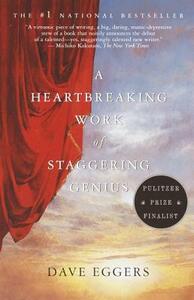Take a photo of a barcode or cover
Bit too long (but he warned me it would be)
Stuff in his 20s about the magazine was fuzzy and unfocused (again I was warned)
Captured how when we are young we sincerely believe that we can make a lasting difference - and how insufferable and arrogant the youth can be.
What I like about Eggers is he doesn't try to be likable - and often isn't. The "Wallet" chapter is brilliant. But as a narrator he definately outstayed his welcome.
Stuff in his 20s about the magazine was fuzzy and unfocused (again I was warned)
Captured how when we are young we sincerely believe that we can make a lasting difference - and how insufferable and arrogant the youth can be.
What I like about Eggers is he doesn't try to be likable - and often isn't. The "Wallet" chapter is brilliant. But as a narrator he definately outstayed his welcome.
This is one of my favorite books. Dave Eggers is a wonderful writer with a unique voice.
This book is not traditional in the sense that it is not only a narrative. Much of the book is emotion that comes out as rants as Eggers tries to raise Toph, his 7/8-year-old little brother.
This book is not traditional in the sense that it is not only a narrative. Much of the book is emotion that comes out as rants as Eggers tries to raise Toph, his 7/8-year-old little brother.
What in God’s name did I just read? 437 pages of ego dressed up as philosophical contemplation. 437 pages of trying to verify why all the bad things happened in Eggers life.
I’m don’t denying that Eggers was dealt a heavy hand, and that none of it would have been easy. But if you’re going to write a book about your life, don’t write yourself to be a dickhead - even if that’s what you had intended going into the work. You’re asking people to not like you or your work.
I’m don’t denying that Eggers was dealt a heavy hand, and that none of it would have been easy. But if you’re going to write a book about your life, don’t write yourself to be a dickhead - even if that’s what you had intended going into the work. You’re asking people to not like you or your work.
Things to remember: the lattice. Read for Colon's AP Literature class 2013
challenging
inspiring
lighthearted
slow-paced
Oh dear, thus has cost me an audiobook slump. Which is the first time ever I had such a slump! Or one of very few times. Anyway, this is linguistically interesting, meta and self-aware and I can see how it was revolutionary in a way when it was published, BUT it has no plot, no storyline, no cohesion. It's just a very long stream.of consiousness ramble, which would be entertaining and fun for 200 pages maybe, but for the length of this book it would really need something more than wit to keep me enthusiastically engaged.
I'm a bit unsure how I feel about this book. As a piece of nonfiction, it is incredibly compelling. As a work of fiction (which is, I think, how one is forced to read it), it is enigmatic.
I'm not put off by the book's showiness or postmodern self-referentiality, but I am put off by the character, as it were, of Dave Eggers. Dave Eggers, the writer, is clearly aware of the negative aspects of Dave Eggers's, the character's, personality, as he highlights them, again and again, especially in the later stages of the book. This is acceptable, in fiction, as a form of self-flagellation, so long as there is some form of redemption, or enlightenment, by the end. It is clear Dave Eggers, the writer, has had that moment of enlightenment about his younger self, but there is no such moment depicted in the book, at least not in an obvious way. That's not necessarily a bad thing, but it begs the question of what the reader has gotten out of reading the book. The author has clearly undergone a catharsis, but what have we gotten for following him along the way?
I honestly don't know, but couldn't rate this any less than four stars, all the same.
I'm not put off by the book's showiness or postmodern self-referentiality, but I am put off by the character, as it were, of Dave Eggers. Dave Eggers, the writer, is clearly aware of the negative aspects of Dave Eggers's, the character's, personality, as he highlights them, again and again, especially in the later stages of the book. This is acceptable, in fiction, as a form of self-flagellation, so long as there is some form of redemption, or enlightenment, by the end. It is clear Dave Eggers, the writer, has had that moment of enlightenment about his younger self, but there is no such moment depicted in the book, at least not in an obvious way. That's not necessarily a bad thing, but it begs the question of what the reader has gotten out of reading the book. The author has clearly undergone a catharsis, but what have we gotten for following him along the way?
I honestly don't know, but couldn't rate this any less than four stars, all the same.
Ugh.
I appreciate that the author was going for a highly self-conscious narrative, playing off the modern obsession with knowing everything (even tying in to Real World) etc etc but my problem was that it didn't seem like a device. It seemed like he actually wanted people to know all this and it just came across as angry, self-pitying and self-aggrandising.
Blah blah blah, my parents died, oh woe is me, blah blah, I'm such a cool 'parent' blah blah blah, oh my god, I need to be more of a parent-parent, blah, but oh no we're too cool for that blah blah.
A friend has apparently read this twice and that he felt it was blaaaah the first time too. I'm not wasting any of my life reading it again to see if it's *actually* a work of genius.
I appreciate that the author was going for a highly self-conscious narrative, playing off the modern obsession with knowing everything (even tying in to Real World) etc etc but my problem was that it didn't seem like a device. It seemed like he actually wanted people to know all this and it just came across as angry, self-pitying and self-aggrandising.
Blah blah blah, my parents died, oh woe is me, blah blah, I'm such a cool 'parent' blah blah blah, oh my god, I need to be more of a parent-parent, blah, but oh no we're too cool for that blah blah.
A friend has apparently read this twice and that he felt it was blaaaah the first time too. I'm not wasting any of my life reading it again to see if it's *actually* a work of genius.
This book is the origin of my loathing of Dave Eggers. Yes, I loathe him. I read this, and I had to admit that he can write. That he is very intelligent, funny, that he'd gone through something tragic, and that he is a wonderful brother, I can also admit. Despite all these things, this book made me want to punch him in his smug, talented face. Throughout the book, he is so self-deprecating, all the while begging you to notice how smart he is (I mean the title alone...). He's deliberately showy while constantly putting himself down, and it left me feeling that he was the most disingenuous, self-satisfied writer I would ever care to read. Blech. Perhaps I would revile him less if he'd stuck closer to a story about him and his brother, because I really don't care about his life in San Francisco, his magazine, his dating life. I *really* don't care about his dating life.
It has since come to my attention that people love his other books. They love _Zeitoun_. They love _What is the What_. Can I love them? I just don't know. It would mean rearranging my feelings about him when I've comfortably detested him for fifteen years. We'll see.
It has since come to my attention that people love his other books. They love _Zeitoun_. They love _What is the What_. Can I love them? I just don't know. It would mean rearranging my feelings about him when I've comfortably detested him for fifteen years. We'll see.




